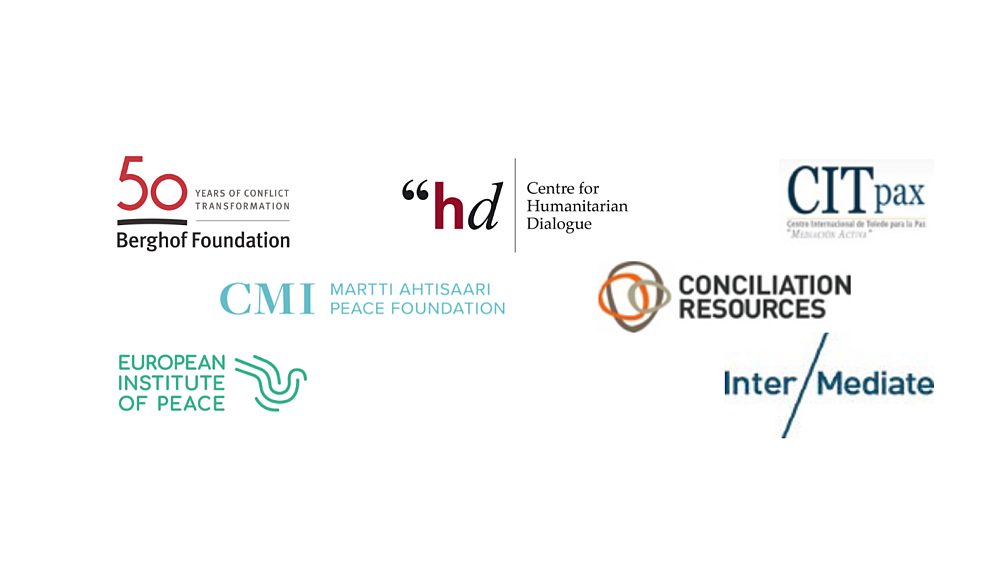PRESS RELEASE | 10 Sept 2021
A call to rethink Europe's 'counter-terrorism' strategy and prioritise dialogue
Joint statement by peace and conflict resolution organisations

Seven peace organisations are calling on Europe to prioritise dialogue with armed groups and ensure legal routes for peace and mediation actors to engage with them
The 20th anniversary of 9/11 is a critical opportunity to rethink Europe’s counter-terrorism strategy. For the past two decades governments have prioritised ending terror through force and security strategies. The next two decades must prioritise engagement and dialogue, for the best chance to stop violence long-term and prevent future conflicts. And peace organisations will need more legal routes to engage with radical armed groups, despite our abhorrence of their tactics.
We must seize this opportunity to re-set, because radical violence will continue to dominate and shape conflict dynamics for the foreseeable future. Despite the billions invested since 2001 to defeat radical armed groups militarily, they continue to draw support from communities whose political grievances remain unaddressed, and who bear the brunt of endless wars. Investment in programmes to prevent violent extremism will continue to be critical. But they will not be enough without an equal investment in tailored peacemaking strategies, including dialogue with armed groups and their supporters. This is even more urgent now that Covid-19 is aggravating conflict drivers and widening the reach of non-state armed actors.
Peacemaking organisations also need greater legal protection to engage with proscribed groups driving conflicts. The new Concept on EU Peace mediation depends on enabling some direct dialogue with armed groups, within a wider strategy that includes security and stabilisation approaches. The Concept also aims to protect the space for civil society to talk to proscribed actors. But Europe’s growing raft of counter-terrorism laws and proscription regimes have effectively criminalised most engagement with radical groups, drastically limiting the space for dialogue channels. This hinders conflict resolution efforts to explore de-escalation or find nonviolent solutions to political grievances driving even the most ideological actors. It also puts peace actors at risk, particularly community-based mediators on conflict frontlines.
Peace through dialogue is a core European value. Dialogue with radical armed actors is neither a substitute for security and stabilisation strategies, nor a panacea in itself. But Europe’s home experience with armed insurgencies teaches that conflicts rarely end without direct and sustained dialogue with those fighting, as part of efforts to address the conflict’s political and social roots.
To save lives, protect peace actors and conserve precious aid resources, the undersigned peace and conflict resolution organisations commit to work together to promote dialoguebased solutions to radical violence during this next phase of counter-terrorism and conflict resolution strategies.
We will:
Collaborate to widen dialogue opportunities in conflicts where proscribed groups play a dominant role and where a European policy decision to lift legal and political obstacles to direct peace dialogue could be transformative. Priorities for policy coordination include Mali, the Lake Chad Basin, Libya, Somalia, Mozambique, Lebanon, Yemen, Palestine and Syria.
Collectively share lessons and resources on improving legal safeguards around peace, dialogue and proscription to a) better understand and mitigate the impact of proscription regimes and counter-terrorism laws on peace and conflict, b) make a stronger public interest case for peace initiatives and actors to benefit from special legal protections; and c) establish consensus on criteria for a genuinely benign engagement with proscribed groups, to provide reassurance to policy makers and limit the risks for practitioners.
Advocate for greater protection and support for peace and mediation actors that are trying to open genuinely benign channels to proscribed groups to promote deescalation and further a peace process.
Support community-based actors in conflict zones working to address grievances fuelling radicalised violence, to better support national political conflict resolution efforts and widen the space for participation of community-based peacemakers, particularly women, youth and faith leaders, in international peacemaking initiatives.
We also invite our donors and partners to:
Support direct dialogue as a pragmatic and essential strategy to end conflicts with radical armed groups, alongside and in greater alignment with security and stabilisation pillars, based on core European values and underpinned by Europe-based expertise in peace and conflict resolution. This would be coherent with the Concept on EU Peace Mediation, which recognises dialogue as an effective avenue for Europe to pursue its foreign policy and security objectives. It would also advance the European External Action Service’s initiative to promote mediation and dialogue as first response to emerging and ongoing crises.
Ensure that European counter-terrorism laws on engagement with proscribed groups recognise peace dialogue as a benign activity in the public interest, and integrate appropriate exemptions and protections to enable legitimate peace work to continue unimpeded.
Establish an inter-governmental mechanism on peace and proscription, in collaboration with expert peace organisations, to identify opportunities to advance dialogue and coordinate a collective policy approach to the practice of, and legal conditions for, peace dialogue with proscribed actors.
Preventing violent conflict and terrorism is a higher priority today than ever, for Europe and the wider world. We will need dialogue as well as security and stabilisation strategies if the third decade of the fight against terrorism is to end on a more promising note than the preceding two. This will take political courage. But it will also prove that Europe is ready to act on its principles: to take a stand for peace.
European Institute of Peace | Inter Mediate | Centre for Humanitarian Dialogue | Berghof Foundation | CMI Martti Ahtisaari Peace Foundation | Conciliation Resources | CITPax Toledo International Centre for Peace
Media contact
You can reach the press team at:
+49 (0) 177 7052758
email hidden; JavaScript is required


